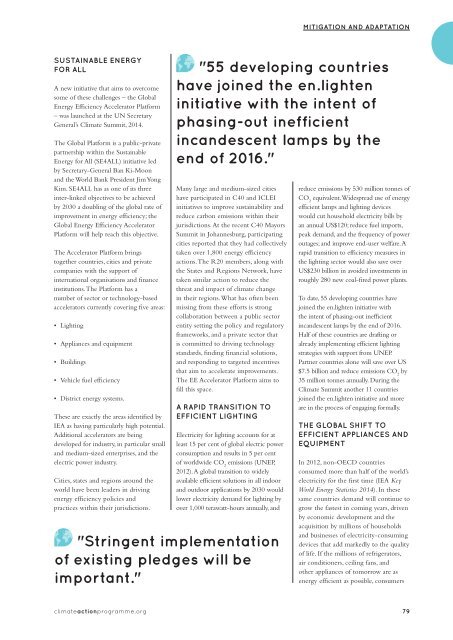Climate Action 2014-2015
You also want an ePaper? Increase the reach of your titles
YUMPU automatically turns print PDFs into web optimized ePapers that Google loves.
MITIGATION AND ADAPTATION<br />
SUSTAINABLE ENERGY<br />
FOR ALL<br />
A new initiative that aims to overcome<br />
some of these challenges – the Global<br />
Energy Efficiency Accelerator Platform<br />
– was launched at the UN Secretary<br />
General’s <strong>Climate</strong> Summit, <strong>2014</strong>.<br />
The Global Platform is a public-private<br />
partnership within the Sustainable<br />
Energy for All (SE4ALL) initiative led<br />
by Secretary-General Ban Ki-Moon<br />
and the World Bank President Jim Yong<br />
Kim. SE4ALL has as one of its three<br />
inter-linked objectives to be achieved<br />
by 2030 a doubling of the global rate of<br />
improvement in energy efficiency; the<br />
Global Energy Efficiency Accelerator<br />
Platform will help reach this objective.<br />
The Accelerator Platform brings<br />
together countries, cities and private<br />
companies with the support of<br />
international organisations and finance<br />
institutions. The Platform has a<br />
number of sector or technology-based<br />
accelerators currently covering five areas:<br />
Lighting<br />
Appliances and equipment<br />
Buildings<br />
Vehicle fuel efficiency<br />
District energy systems.<br />
These are exactly the areas identified by<br />
IEA as having particularly high potential.<br />
Additional accelerators are being<br />
developed for industry, in particular small<br />
and medium-sized enterprises, and the<br />
electric power industry.<br />
Cities, states and regions around the<br />
world have been leaders in driving<br />
energy efficiency policies and<br />
practices within their jurisdictions.<br />
Many large and medium-sized cities<br />
have participated in C40 and ICLEI<br />
initiatives to improve sustainability and<br />
reduce carbon emissions within their<br />
jurisdictions. At the recent C40 Mayors<br />
Summit in Johannesburg, participating<br />
cities reported that they had collectively<br />
taken over 1,800 energy efficiency<br />
actions. The R20 members, along with<br />
the States and Regions Network, have<br />
taken similar action to reduce the<br />
threat and impact of climate change<br />
in their regions. What has often been<br />
missing from these efforts is strong<br />
collaboration between a public sector<br />
entity setting the policy and regulatory<br />
frameworks, and a private sector that<br />
is committed to driving technology<br />
standards, finding financial solutions,<br />
and responding to targeted incentives<br />
that aim to accelerate improvements.<br />
The EE Accelerator Platform aims to<br />
fill this space.<br />
A RAPID TRANSITION TO<br />
EFFICIENT LIGHTING<br />
Electricity for lighting accounts for at<br />
least 15 per cent of global electric power<br />
consumption and results in 5 per cent<br />
of worldwide CO 2<br />
emissions (UNEP,<br />
2012). A global transition to widely<br />
available efficient solutions in all indoor<br />
and outdoor applications by 2030 would<br />
lower electricity demand for lighting by<br />
over 1,000 terawatt-hours annually, and<br />
"Stringent implementation<br />
of existing pledges will be<br />
important."<br />
"55 developing countries<br />
have joined the en.lighten<br />
initiative with the intent of<br />
phasing-out inefficient<br />
incandescent lamps by the<br />
end of 2016."<br />
reduce emissions by 530 million tonnes of<br />
CO 2<br />
equivalent. Widespread use of energy<br />
efficient lamps and lighting devices<br />
would cut household electricity bills by<br />
an annual US$120; reduce fuel imports,<br />
peak demand, and the frequency of power<br />
outages; and improve end-user welfare. A<br />
rapid transition to efficiency measures in<br />
the lighting sector would also save over<br />
US$230 billion in avoided investments in<br />
roughly 280 new coal-fired power plants.<br />
To date, 55 developing countries have<br />
joined the en.lighten initiative with<br />
the intent of phasing-out inefficient<br />
incandescent lamps by the end of 2016.<br />
Half of these countries are drafting or<br />
already implementing efficient lighting<br />
strategies with support from UNEP.<br />
Partner countries alone will save over US<br />
$7.5 billion and reduce emissions CO 2<br />
by<br />
35 million tonnes annually. During the<br />
<strong>Climate</strong> Summit another 11 countries<br />
joined the en.lighten initiative and more<br />
are in the process of engaging formally.<br />
THE GLOBAL SHIFT TO<br />
EFFICIENT APPLIANCES AND<br />
EQUIPMENT<br />
In 2012, non-OECD countries<br />
consumed more than half of the world’s<br />
electricity for the first time (IEA Key<br />
World Energy Statistics <strong>2014</strong>). In these<br />
same countries demand will continue to<br />
grow the fastest in coming years, driven<br />
by economic development and the<br />
acquisition by millions of households<br />
and businesses of electricity-consuming<br />
devices that add markedly to the quality<br />
of life. If the millions of refrigerators,<br />
air conditioners, ceiling fans, and<br />
other appliances of tomorrow are as<br />
energy efficient as possible, consumers<br />
climateactionprogramme.org 79












